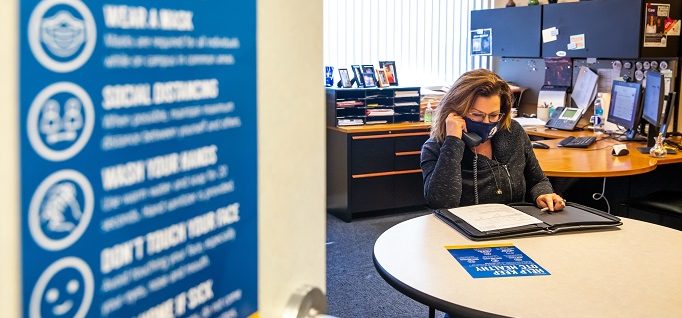Out of the shadows
By Dennis Pierce
March 31, 2022
Meeting students’ mental health needs is a community-wide effort
On the first day of spring classes, Joan Barrett was walking around the Ozarks Technical Community College (OTC) campus as usual, greeting students and making sure they knew where to go. It’s what Barrett, the vice chancellor for student affairs, does at the beginning of every academic term.
But this wasn’t an ordinary start to a semester. During the course of the day, Barrett saw two separate students burst into tears when she said hello.
The problems they were dealing with were minor in the grand scheme of things: They couldn’t find their classroom, or they were stressed out about the start of a new term. But as the pandemic enters its third year, “those issues that are usually manageable have become less so,” she notes.
Many community college students already struggled with mental health issues such as anxiety or depression prior to the pandemic, says Diane Finley, a professor of psychology at Prince George’s Community College in Maryland. Finley, who is a national certified counselor and serves on several committees for the American Psychological Association, says she has seen several students enroll in her psychology classes at the college because they think it’s a chance to get therapy. When they learn it’s not, she refers them to campus counseling services.
Covid has brought these mental health challenges to light, while increasing the number of students who are dealing with anxiety or depression even further. But as the pandemic drags on, “people’s resilience is becoming frayed,” says Joyce Bateman, dean of students at OTC. “We’re seeing more reports of low-level angst as well.”
This angst affects students’ ability to learn.
Community college leaders are employing a number of strategies to solve the mental health crisis, such as training faculty to recognize when students need help, outsourcing mental health services to private companies, and looking to community partners for assistance.
A caring culture
At OTC, campus leaders have adopted a holistic approach to student mental health that includes building relationships with students, providing wraparound services to reduce the anxiety they’re feeling, and connecting them with counseling as needed.
Leaders have worked hard to establish a culture in which students feel cared for, a concept they call “OTC Cares.”
“Even the little things are important,” Barrett says, “like staff and administrators going out into the hallways between classes and being present to answer students’ questions.”
When OTC shifted to remote learning early on during the pandemic, employees volunteered to do “wellness checks” by calling every student at least twice during the semester to make sure they had what they needed to continue their education.
Although students are back on campus for their instruction, this practice still continues, Barrett says, because it proved to be so beneficial. During the spring 2021 semester, the college also began offering free breakfasts for students as a way to relieve anxiety for those who were food insecure—or even those who didn’t have time to grab breakfast before classes.
Recognizing the warning signs when students might need additional mental health support and understanding how to approach them successfully and refer them to a counselor is critical. For several years, OTC offered Mental Health First Aid (MHFA) training for faculty and staff on its campus. This skills-based training teaches people how to identify, understand, and respond to signs of a mental health or substance abuse challenge in adults. Now, the Missouri Department of Mental Health offers this training online at no cost—and the college continues to encourage its employees to participate.
More than 200 OTC faculty and staff have taken the eight-hour MHFA course. “You don’t have to know all the intricacies, but you can recognize when someone is in distress and connect them with help,” Bateman says.
She tells the story of a former OTC student who, hungry and homeless, broke down crying in a campus locker room. A faculty member who saw the student could have called security. Instead, because he had experienced the MHFA training, he called a counselor for the student—and that student went on to graduate with two degrees.
Too often, faculty don’t get the training they need to recognize the warning signs or refer students to a counselor, Finley says, adding: “We need better mental health training for faculty in general.”
She says it can be difficult for faculty to find the time for this kind of training—and colleges should carve out time in faculty schedules and offer incentives for them to participate.
This is an excerpt from an upcoming issue of Community College Journal, hitting mailboxes in April.



